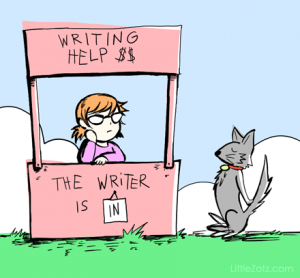
If you’ve been writing for a while, chances are you thought about consulting. It’s a terrific way to help others, as well as to increase your authority and income.
That said, like all worthy ventures, several important questions come to mind before starting:
- Which areas are you going to offer consulting/coaching on?
- Which methods are you going to use?
- Will you be offering phone, face-to-face and/or e-mail support?
- How much will you charge?
And
- How did other successful freelance writers who you’ve been following for a while get around to it?
Today, you’ll be getting the answer for the last (but maybe the most inspiring) question on the list from the lovely Lauren Tharp.

Lauren Tharp is the face behind the award-winning writing blog LittleZotz Writing, associate editor and community manager of the amazing BAFB and the new Editorial Assistant the famous of CopyBlogger.
Enjoy!
What inspired you to offer consultancy to other writers? Character traits, certain experiences, your mentors…?
In 2013, I had partnered with a freelance editor with the plan of offering a class to writers and editors looking to start their freelancing careers. The editor ended up going in a different direction; however, I still thought the idea was fantastic and wanted to pursue it on my own. So I decided to start offering one-on-one mentoring.
I was fairly confident I could do a good job because I had worked as an English tutor when I was younger, and was briefly a children’s martial arts instructor. If you can control a room full of kids throwing punches at each other without anyone getting hurt, you can command pretty much any crowd. [laughs].
When did you feel ready to offer this service? How long had you been writing/blogging?
This is a difficult question to answer. I’ve been writing for pay since I was a teenager – and I’m in my thirties now – but I didn’t make it my sole source of income until I was twenty-five. So I had been writing for over a decade; however, I had only been in business for about three years.
What was your biggest challenge as a consultant, and how did you overcome it?
Over the years I’ve become a bit anxious about talking on the phone. I do well in writing and when I’m interacting with people in person, but I find exchanges that are purely voice-based to be a bit nerve-wracking.
So, since I couldn’t visit every mentee in person, I ended up utilizing Skype’s instant messenger function. That way, I’m able to do what I do best: Write. And, that way, my mentee is guaranteed to get me at my best.
They even get a PDF transcript of our conversation to refer back to when we’re done!
Do you have any favorite resources on this topic? (Links to your own posts will be appreciated too:))
Well, since you said I’m allowed to link to my own posts, I do have these two…
“5 Questions to Ask Before Hiring a Mentor”
“5 Things to Expect When You Become a Mentor”
What advice would you give writers who are thinking about offering consultancy services?
Practice answering questions elsewhere first. Either find ways to get yourself interviewed, or answer them on your blog, or do a video series. When the time comes to actually mentor someone, you’re not going to have time to carefully think over your answers – so it’s good to have practice answering questions elsewhere as training to prepare for that moment.
You should also think about what you’re good at and who would be the best client to teach. For me, I decided early on that my favorite type of mentee was someone just about to start their freelancing career. My own mentor, Sophie Lizard, prefers to teach people who are a bit further along. It’s going to probably be the toughest decision you make – next to the decision to mentor at all! – but it’s worth putting a lot of thought into.
*
I hope you enjoyed the interview. Don’t hesitate to spread the word if you found this helpful.
Is consultancy something you do or are thinking of doing, Pinar. I confess the thought never occurred to me. But, certainly, it’s something to think about!
Hi Yvette,
Thanks for commenting! Yes, I’m thinking of offering consulting, especially to writers who write fiction and non-fiction at the same time. It’s definitely a great way to take advantage of all the experience you’ve gained while helping others who are probably going through similar hurdles. 🙂